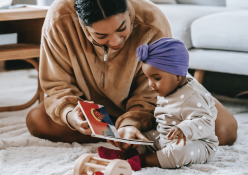Puberty isn’t all heavy eyeliner, moodiness and tantrums. It’s also being vulnerable and wanting support from the people we look up to most – our parents
Ah, puberty. That time we’ve all experienced, when we weren’t sure why we hated everyone and everything for seemingly no reason. The time when people told you it’s ‘exciting’ but all you wanted to do was listen to My Chemical Romance and stare
at the blank sky in dramatic main-character fashion. And now, as parents, your children are doing the same thing (although it might look a little different).
What’s Going On?
Though we’ve been down the same road before, nobody’s experiences of puberty are the same, so it’s important to try and understand what might be going on. Not only are children transitioning physically, they’re also going through some strange, confusing emotional changes such as mood swings, changes in energy levels, wanting independence but also parental support, self-esteem and body image issues and wanting to explore their sexual identities.
If you’ve seen any coming-of-age film (think Lady Bird, Almost Famous or Boyhood) you’re familiar, and might even identify
with those feelings of wanting to become your own person – but still wanting to be recognised by others. Kids are going through so many physical changes that might be a bit embarrassing and, at times, unwanted –they’re also excited yet afraid of all the sudden changes happening. As parents, we want to help them feel comfortable in their own skin, and be reassuring, even though it may feel like being at war with a tiny version of yourself.
Extend an Olive Branch
You might get a little fed up with the raging hormones being targeted your way, but in this confusing time it’s important to reassure and listen to them in a non-judgemental way. Getting angry and blaming children for feeling anything other than happiness doesn’t help them feel accepted and normal. Puberty is the time when children’s mindsets are shaped for their adult selves… How you play a role in that shaping will have an effect in years to come.
• Privacy: Let them be alone if they want to be, but also be ready and accepting for when they want to be in company or need some loving – chat to them about reasonable family time versus personal time limits. Allow them to explore their independence safely, knowing you’ll be there if they need a shoulder.
• Compassion and reassurance: Put yourself in their shoes – they’re most likely struggling with their identity. Praise them for their achievements, and stay interested in their lives. Be open, compassionate, understanding and reassuring that you have their back.
• Listen: It’s frustrating for you as a parent, but don’t get upset at them when they speak about feeling hatred towards themselves… It’s not their fault. Stay calm during outbursts, and let them open up to you and know that they can trust you’ll listen to them.
• Talk and explain: It’s helpful to get advice from other parents or from your partner about how to talk to your child about puberty. This will help you feel supported when discussing these topics with your own child. Explain how it all works, and find compromises where necessary.
• Normalise: Not everyone has the same experience of puberty; some go through different changes – some changes are more or less pronounced than others. They may feel embarrassed about certain things, which is common, and helping them understand that everyone develops at their own pace can help. Reinforce the idea that there’s nothing ‘wrong’ with them, and that you accept them for who they are and will support them.
No parent is perfect – we’re all just trying our best, and we can get confused too. But stay strong, trust in your skills as a parent, and don’t be afraid or embarrassed to reach out to others for support. Stay involved with your child to help build trust between the two of you – adolescence is temporary. Accept that your child is growing up, and that your family’s dynamic is
changing too. It’s all part of the circle of life!
Words by Saadiqah Schroeder
Photography: Pexels





